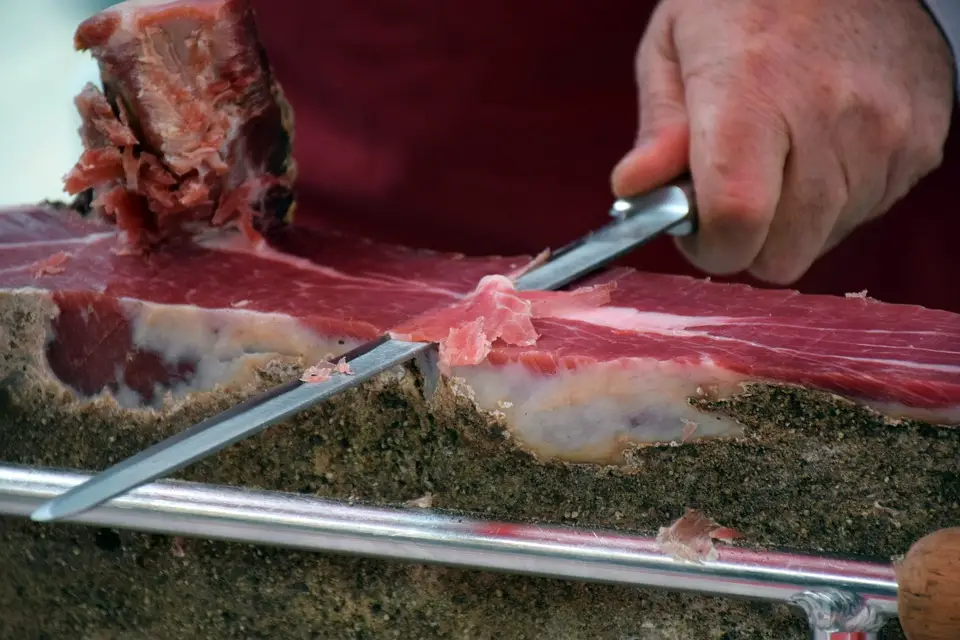As Poslovni Dnevnik/Marta Duic writes, this year, more precisely until the end of February, three new names of protected Croatian products were registered at the level of the European Union – Rudarska greblica, Dalmatinska pecenica and Dalmatinska panceta.
Thus, Croatia, as the youngest member state of the EU, is in ninth place in terms of the number of registered names of domestic agricultural and food products, and the first on the list of protected Croatian products to receive the label was Krk´s much loved prosciutto. How much this label helps when it comes to actual product placement and the penetration of foreign markets was discovered by the manufacturers themselves.
“We also have an additional fifteen products that we´ve protected at the national level and are in preparation for the procedure or are already in the process of registration at the EU level, and six more products for which the national protection procedure is underway.
By protecting the name, manufacturers protect the reputation of their product from misuse and damage, and it is this sign that guarantees the consumer the purchase of an authentic and controlled product which boasts proper recognised quality and is of local origin. The recognisability of a product is connected with the recognisability of the area where it is produced, which contributes to the strengthening of the tourist offer, but also to the sustainable development of rural areas.
The importance of registration and protection also lies in the fact that it ensures classification into a higher price category, which for the manufacturer means better market positioning and of course – higher income.
According to the European Commission (EC), these products fetch an average of 2.3 times more in terms of price than a similar unlabelled product, and according to a survey conducted by the ministry on more than fifty certified manufacturers, as many as 68 percent of manufacturers have noticed an increase in demand for their product since they have become proud bearers of such a label,¨ they point out from the Ministry of Agriculture.
Ante Madir, executive director of the Croatian Prosciutto Cluster, explained that precisely because of the sensory properties and specific traditional production technology, Croatian prosciutto has a great export potential and potential for placement via tourism through the country´s already very rich gastronomic offer.
As he says, through the Croatian Prosciutto Cluster and various prosciutto associations, they promote these protected Croatian products, every year in another city they organise Croatian Prosciutto Days focused exclusively on protected prosciutto, and representatives of the Cluster participate in all specialised fairs across the country and abroad.
“EU labels of protected geographical origin, which are carried by Krk, Drnis and Dalmatian prosciutto, and the label of originality boasted by Istrian prosciutto, are a guarantee of quality and are increasingly recognised by local customers. Foreign tourists have long been aware of what is involved when it comes to such labels, they know the difference and always put quality before price.
Designations of protected geographical origin and originality are important not only for their recognisability, but they also have the function of protection against the clutches of the grey market. Here in Croatia, the production of prosciutto is growing from year to year, but this is not enough to cover its consumption.
Specifically, we eat about a million pieces of prosciutto a year, and we produce about 450,000 pieces of it. The growth of production was not stopped by the coronavirus pandemic, but, unfortunately, it slowed things down in terms of placement. Tourism suffered because of the pandemic, and tourism is otherwise the best opportunity for the placement of Croatian prosciutto caused a decline in sales.
When it comes to exports, we have a trend of increasing sales of our prosciutto in the EU. Some prosciutto companies in foreign markets had an increase in sales in 2020, regardless of the pandemic, up to even 30 percent more when compared to 2019,” said Madir.
¨Croatia exports its prosciutto to all countries in the immediate region, but also to those countries where the Croatian diaspora live, such as Austria and Germany. At the end of last year, one Croatian prosciutto company exported the first quantities of prosciutto to Ukraine. We also had exports to New Zealand and Hong Kong.
Croatian prosciutto is sold in Serbia, Northern Macedonia, and Bosnia and Herzegovina. The Association of Dalmatian Prosciutto Producers prepared the documentation and applied for the tender M3.2.1-2, for support for information and promotion activities. If the funds are obtained through a tender, then we will use them for the promotion and recognition of prosciutto as a protected EU product,¨ added Madir.
One of the producers of protected Croatian prosciutto, more precisely the Dalmatian type, is Vlade Prancic, and his facility annually produces about a hundred tonnes of prosciutto. As he says, in this ongoing pandemic crisis, sales have dropped by twenty percent, but he believes that quality products always find their way to the customer, so he remains optimistic about the future.
“When it comes to protected Croatian products, local customers are increasingly aware and it is not a problem for them to spend a little more money on such products. On the other hand, buyers in foreign markets such as Germany or Austria, have long recognised the quality of protected products and this is our only chance given that the quantity Croatia has can quite simply not compete with Spanish and Italian manufacturers.
We sell our prosciutto almost 75 percent of our production through the HoReCa sector throughout Croatia, and our exports grow from year to year, so 25 percent of our total production goes off to Germany, Austria, Slovenia and the Czech Republic. Events, such as Croatian Prosciutto Day, contribute to the branding of protected Croatian products, but that is not enough.
Most producers are small family prosciutto manufacturers, they are masters of prosciutto, but not for marketing and branding, so in the promotion of protected Croatian products, we really need the help of our state institutions and continuous campaigns that would educate customers and other producers,¨ said Prancic.
According to several published studies related to various European Union trademarks, consumers are more aware of trademarks from southern Europe, and the reason for this may lie in the fact that Italy, France and Spain have around 700 protected products to boast of. The experience we have from 2020 has shown us the importance of domestic production in all segments.
For the latest travel info, bookmark our main travel info article, which is updated daily.
Read the Croatian Travel Update in your language – now available in 24 languages.
Join the Total Croatia Travel INFO Viber community.









